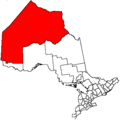Indian settlement in Ontario, Canada
| MacDowell Lake Mishi Sakahikaniing | |
|---|---|
| Indian settlement | |
| MacDowell Lake Indian Settlement | |
 | |
| Coordinates: 52°13′N 92°44′W / 52.217°N 92.733°W / 52.217; -92.733 | |
| Country | |
| Province | |
| District | Kenora |
| First Nation | McDowell Lake |
| Area | |
| • Land | 1.94 km (0.75 sq mi) |
| Population | |
| • Total | 0 |
| • Density | 0.0/km (0/sq mi) |
| Website | mcdowelllake.firstnation.ca |
McDowell Lake First Nation (Oji-Cree: Mishi Sakahikaniing) is a small Oji-Cree First Nation band government located in Northern Ontario, located approximately 155 km northeast of Red Lake, Ontario, Canada, on the central western shore of McDowell Lake. As of December, 2007, their total registered population was 52. It is part of the Keewaytinook Okimakanak Council (Northern Chiefs) and the Nishnawbe Aski Nation.
The First Nation's MacDowell Lake Indian Settlement, also known as MacDowell Lake, Ontario, is accessible by float and ski equipped aircraft. Though no winter/ice roads connect this community in the winter, a person can use either snowmobiles or snowshoes to trail off from winter/ice roads and head towards the community. Nearest winter/ice roads from the community connect Red Lake, Ontario, to North Spirit Lake, Deer Lake, and Sandy Lake First Nations.
History
The small community of Misi-zhaaga'iganiing was established by trapper Johnny Kenequanash in the 1940s on the central western shore of McDowell Lake, known in Oji-Cree language as Misi-zhaaga'igan, meaning "the grand lake." Misi-zhaaga'igan was the main water way for people travelling by canoes leading North to Windigo Lake or going east towards Cat Lake. Kenequanash and his family was soon joined by the James family. Most Band members were former North Caribou Lake (Weagamow Lake) members and also have close ties with Cat Lake members. For many years the prime economic activity is either trapping or commercial fishing. In 1985, McDowell Lake along with six other community was awarded official Band status. The Governments of Canada, Ontario, the Nishnawbe Aski Nation and six of its member First Nations (Aroland, Keewaywin, McDowell Lake, New Slate Falls, Saugeen, and Wawakapewin) signed an agreement in December 1991 to make lands available to establish Indian reserves in the six communities and to provide basic community facilities. In June 1992, the 4455 ha MacDowell Lake Indian Settlement was remitted, but Census Canada records only 2750 ha in 1996 and 1940 ha in 2006.
Government
Governance
The leadership of the First Nation is determined through a Custom Electoral System. The current Chief is Eli James, with Head Councillor Albert James and Councillor Ellen Keno. Their elected terms began on December 28, 2001.
The First Nation is a member of Keewaytinook Okimakanak Council (Northern Chiefs), a local non-political Chiefs Council. McDowell Lake is also a member of the Nishnawbe Aski Nation, a Tribal Political Organization representing many of the First Nations in northern Ontario.
Services
Government services are provided by the Keewaytinook Okimakanak Council and by the Nishnawbe Aski Nation. Services include:
- KO Telemedicine
- K-Net ISP service
- NAN Police Service
External links
References
- ^ "MacDowell Lake census profile". 2011 Census of Population. Statistics Canada. Retrieved 3 June 2015.
| Places adjacent to McDowell Lake First Nation | ||||||||||||||||
|---|---|---|---|---|---|---|---|---|---|---|---|---|---|---|---|---|
| ||||||||||||||||
